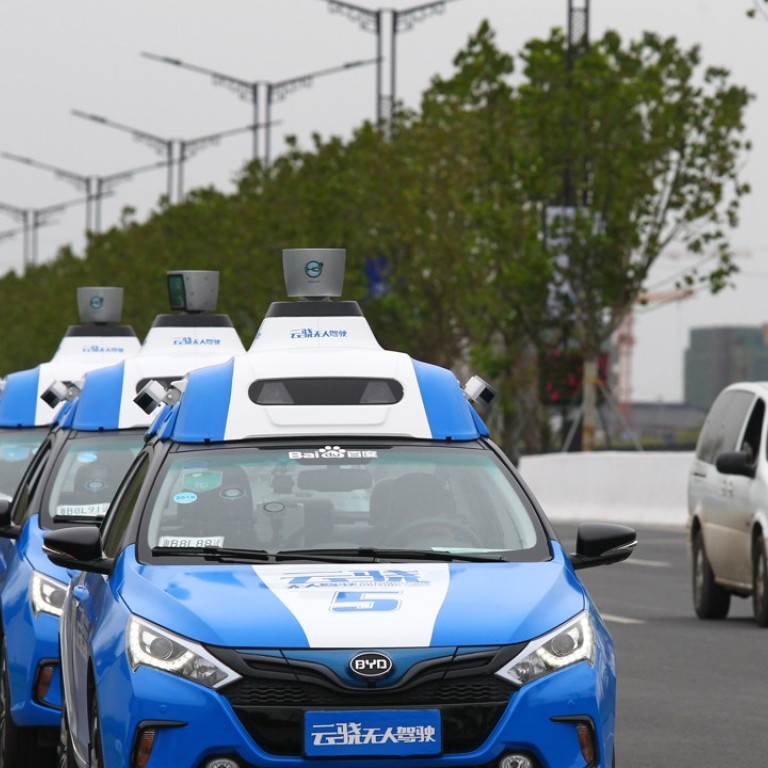
Baidu’s self-driving cars require more human intervention than Alphabet’s Waymo
Baidu, which has ambitions to build an operating system for autonomous cars, requires more human intervention during road tests in the US compared with Waymo, the self-driving unit of Google parent Alphabet.
Beijing-based Baidu, which operates China’s largest internet search service, reported to California’s Department of Motor Vehicles (DMV) that its self-driving cars had “disengaged” from autonomous control every 41 miles (65.9 kilometres), compared with every 5,596 miles for Waymo.
The term disengaged refers to human drivers taking over from a car’s self-driving system or when that autonomous control itself fails.
Baidu, which received a permit to test its autonomous cars in California’s public roads in 2016, reported that its vehicles had 48 “disengagements” between October 2016 and November 2017 after driving a total of 1,971.7 miles.
Waymo’s self-driving cars recorded 65 disengagements between December 2016 and November 2017, when these logged a total of 352,544.6 miles.
The details of those disengagements, which were released last week by California’s DMV, formed part of the supplemental documents requested by the authority from eight companies, including Baidu, Waymo and Nissan Motor.
The DMV earlier this year asked 20 companies licensed to test self-driving cars in the state to submit reports about those trials. Baidu and Waymo were among eight firms that had filed reports considered by the DMV as providing little information.
The US data provided a glimpse of the closely guarded information surrounding self-driving car tests and the relative progress of each carmaker and technology company.
It also showed that Baidu’s self-driving car technology was far from being ready and literally miles behind what US companies have accomplished so far. Waymo reported the smallest rate of disengagement among the companies involved in self-driving tests in the US.
Waymo’s biggest US rival Cruise, the driverless car unit of General Motors, reported that its vehicles drove about 131,000 miles last year in tests that showed human drivers intervened only once every 1,250 miles.
That Cruise report showed that traditional car makers are looking to close the gap with technology firms in developing efficient and safe self-driving vehicles.
Baidu’s report said the situations in which its autonomous cars needed the intervention of human drivers included “localisation error-caused drift” and “misclassification of traffic light detection”, which presumably meant that the self-driving car veered from its course after misreading the traffic light.
In an email reply to inquiries made on Friday, Baidu declined to comment about the disengagements recorded at its US trials beyond what was contained in its report to the DMV.
The stakes are high for a public roll-out of self-driving cars because the expectation is that autonomous vehicles will be capable of efficiently handling different situations on the road.
Baidu, which last November was identified by China’s Ministry of Science and Technology as national champion in the country’s efforts in self-driving cars, was reportedly working on Level 4 capability, which means cars can self-drive in most conditions `without human intervention.
At the CES trade show in Las Vegas in January, Baidu chief operating officer Lu Qi said China was already closing the gap with the US in artificial intelligence, thanks to strong government support and the country’s huge population size, which are key ingredients in promoting the development of the technology.
Baidu was even ranked ahead of Tesla, Uber Technologies and Apple in the race to build self-driving cars, according to a study published in January by Navigant Research. That study was based on the evaluation of 10 criteria, including technology, corporate vision and strategy to commercialise products.
Still, Baidu has been moving rapidly in partnering with more than a dozen car makers and automotive parts suppliers for its self-driving platform Apollo. The company has also teamed up with bus maker King Long United Automotive Industry to produce China’s first fully autonomous bus.
While the death of Elaine Herzberg, who was hit by an Uber self-driving car while crossing the street in Tempe, Arizona in March, cast a pall on the nascent autonomous driving industry in the US, China continued to move forward.
That same month, Beijing gave the long-awaited go-ahead to Baidu to conduct open-road tests for its autonomous vehicles. The firm’s hi-tech rivals Tencent Holdings and Alibaba Group Holding, the parent company of the South China Morning Post, are also conducting their own self-driving tests.
China is also formulating technology standards and industry guidelines for autonomous vehicles as the world’s largest car market plays catch-up with the US in what many see as the future of transport.
The National Development and Reform Commission, China’s top economic planning agency, also unveiled a three-year plan in December, making the development of smart cars a national priority.
Self-driving cars are increasingly seen as an amalgamation of recent hi-tech advances, including 5G and new energy fuel, and the holy grail of the next-generation of technologies that are set to revolutionise the way people live, work and play.
China is likely to emerge as the world’s largest market for autonomous vehicles and mobility services, worth more than US$500 billion by 2030, according to a McKinsey report released last month.

